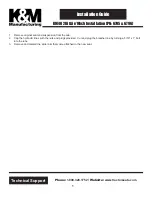
Device description
Oxymax W COS51D
16
Hauser
5.2
Measuring principle
5.2.1
Polarization
When the sensor is connected to the transmitter, a fixed external voltage is applied between the
cathode and anode. The resulting polarization current is indicated on the display of the transmitter.
The current starts high but then drops over time. The sensor can only be calibrated when the display
is stable.
5.2.2
Membrane
The oxygen dissolved in the medium is conveyed to the membrane by the incoming flow. The
membrane is only permeable for dissolved gases. Other substances dissolved in the liquid phase e.g.
ionic substances, will not penetrate through the membrane. Therefore, medium conductivity has
no impact on the measuring signal.
5.2.3
Amperometric principle
The oxygen molecules diffused through the membrane are reduced to hydroxide ions (OH-) at the
cathode. Silver is oxidized to silver ions (Ag+) at the anode (this forms a silver halogenide layer).
A current flows due to the electron donation at the cathode and the electron acceptance at the
anode. Under constant conditions, this flow is proportional to the oxygen content of the medium.
This current is converted in the transmitter and indicated on the display as an oxygen concentration
in mg/l, as a saturation index in % SAT or as an oxygen partial pressure in hPa.
5.2.4
Potentiostatic three-electrode-system
The high-impedance, current-free reference electrode plays an important role.
The formation of a silver bromide or silver chloride coating on the anode uses up the bromide or
chloride ions dissolved in the electrolyte
In the case of conventional membrane-covered sensors working with the two-electrode system, this
causes an increase in signal drift.
This is not the case with the three-electrode system:
The change in bromide or chloride concentration is registered by the reference electrode and an
internal control circuit holds the working electrode potential constant. The advantages of this
principle are significantly increased accuracy of the signal and considerably extended calibration
intervals.
5.2.5
Memosens technology
The sensor is connected to the cable connection (CYK10) without contact. The power and data are
transferred inductively
Once connected to the transmitter, the data saved in the sensor are read digitally. You can call up
these data using the corresponding DIAG menu.
Data that digital sensors save include the following:
• Manufacturer data
– Serial number
– Order code
– Date of manufacture
• Calibration data
– Calibration date
– Calibration values
– Number of calibrations
– Serial number of the transmitter used to perform the last calibration
• Operational data
– Date of commissioning
– Hours of operation under extreme conditions
– Data for sensor monitoring.
















































